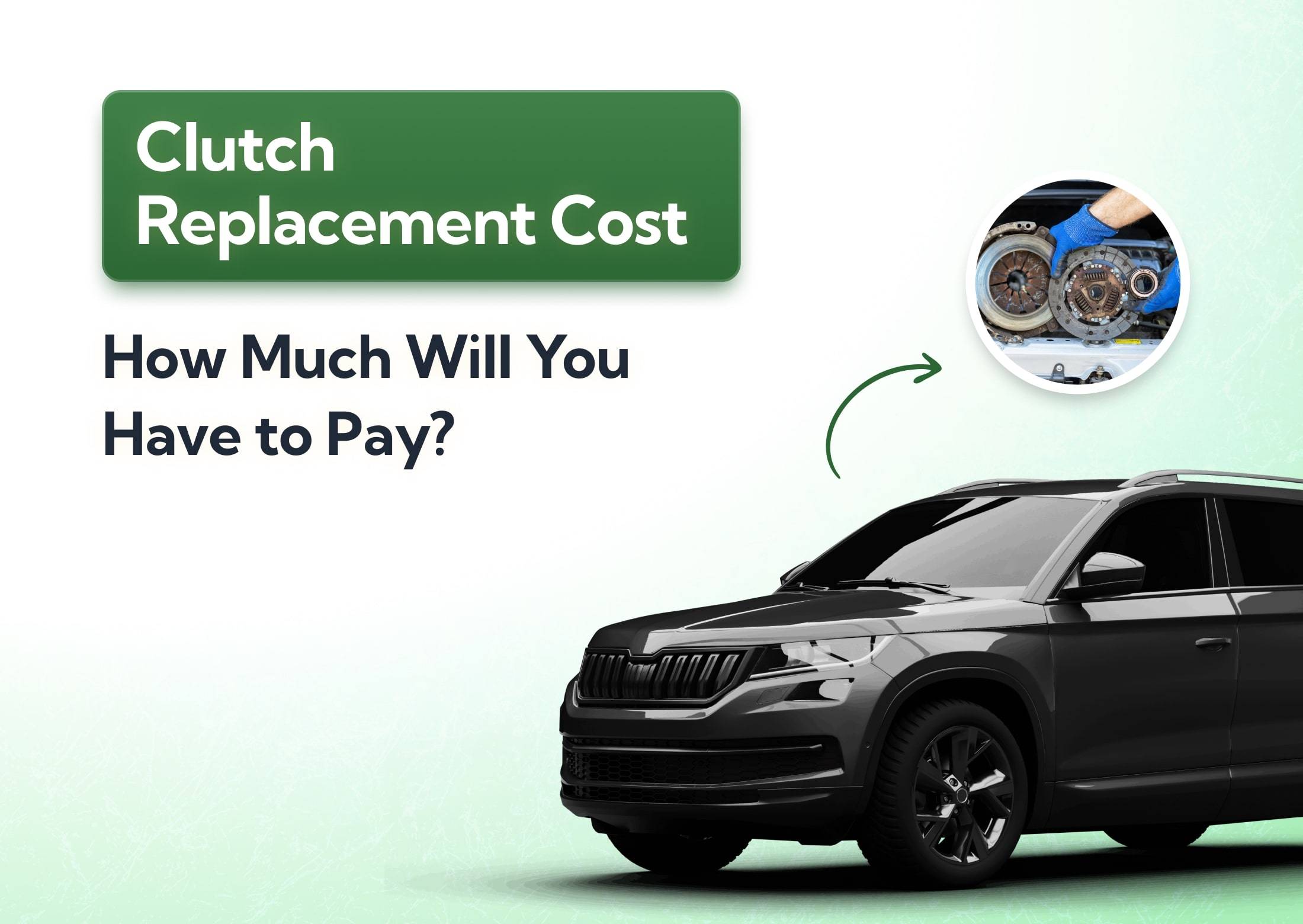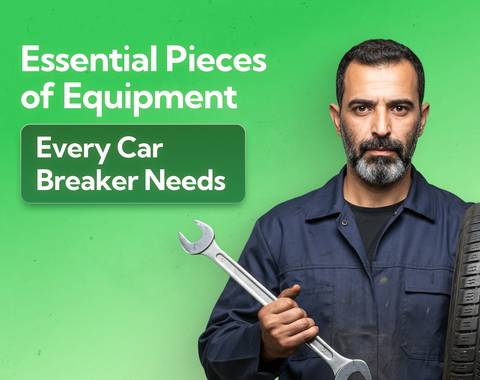Clutch Replacement Cost: How Much Will You Have to Pay?
Clutch replacement costs range from a few hundred to well over a thousand pounds depending on your car, location and the parts you need. This guide breaks down what really drives the price, how to decide whether it’s worth fixing or scrapping and what you can do to avoid clutch problems in the first place.
Last updated: 31st October, 2025

Anthony Sharkey is COO at New Reg Limited (Car.co.uk, Trader.co.uk, Garage.co.uk), driving innovation in vehicle recycling, logistics, and customer experience.

Listen to this story
Replacing a clutch isn’t cheap and if yours is starting to slip, you’ll want to know what you’re in for. On average, UK drivers pay anywhere from £400 to over £1,500 for a clutch replacement, depending on the car. Smaller hatchbacks sit at the lower end, while SUVs and performance models can shoot way past a grand.
The final bill depends on a mix of factors: make, model, labour rates and whether you use OEM or aftermarket parts.
In today’s guide, I’m breaking down what drives the price of a clutch replacement, when it’s worth repairing and how to keep yours healthy for longer.
What's in this article
- 3. What are the common causes of clutch failure?
- 3.1 Aggressive driving habits
- 3.2 Frequent stop-and-go driving
- 3.3 Improper use of the clutch
- 3.4 Lack of regular maintenance
- 3.5 Old or worn-out components
- 3.6 Signs you should replace your clutch or scrap your car
- 3.7 Signs your clutch needs replacing
- 3.8 Repair vs scrap: making the right financial decision
- 4. How to prevent clutch problems to save on costs
What factors affect clutch replacement cost?
The five factors that affect clutch replacement cost are your vehicle’s make and model, the quality of parts used, labour rates in your area, transmission type and extra repairs you might need during the job.
Each one of these factors swings the price by hundreds of pounds, so it’s worth knowing what you’re paying for before you book it in.
Vehicle make and model impact
Some cars are simply cheaper to work on than others.
A small Ford Fiesta or Vauxhall Corsa might only cost £400 to £600 because the parts are inexpensive and easily accessible. But swap that for a BMW, Audi or Land Rover and you’re easily in four-figure territory.
Why? More complex drivetrains, tighter engine bays, pricier OEM parts and more specialised mechanic work.
Clutch types and their impact on cost
Not all clutches are created equal. Some are simple, others are engineering headaches. That difference will show on the invoice as well.
The main types of clutches you’ll see in the UK are:
- Single-plate clutch (£300 to £800): Found in most standard manual cars.
- Multi-plate clutch (£700 to £1,500): Common in performance or high-torque vehicles.
- Dual-clutch transmission (£1,000 to £2,500+): Used in many modern automatics and semi-automatics.
- Hydraulic clutch (£400 to £1,200): Uses fluid to engage and disengage the clutch.
- Self-adjusting clutch (£500 to £1,300): Designed to maintain pedal feel as the plate wears.
- Mechanical or cable-based system (£200 to £700): Uses a cable and lever system (only used in older vehicles).
The more intricate the system, the more it’ll cost to replace. A simple single-plate clutch might be a £500 job, but dual-clutch and DCT systems run into four figures, mostly due to extra parts, electronics and labour-intensive calibration.
Labour rates and their influence on cost
Labour makes up a big chunk of your clutch bill (sometimes more than the parts themselves, actually). Two things mainly decide how much you’ll pay: who’s doing the work and where you’re based.
Dealerships tend to charge top-end rates, often £100 to £150 per hour. But you’re paying for brand-trained technicians and warranty-backed parts. Independent garages usually sit closer to £50 to £90 an hour and save you hundreds, especially for older cars where dealer servicing is a non-essential.
On top of that, labour costs aren’t equal across the UK. You’ll pretty much always pay more in London or the South East, while northern towns and rural areas tend to be 20-30% cheaper for the same job.
Impact of additional parts like the flywheel
Clutch replacements reveal other worn components, and that’s where costs can climb really quickly.
The flywheel is the big one. A dual-mass flywheel (DMF), which is fitted to lots of diesels and modern petrols, can add £400 to £800 if it needs replacing.
But it doesn’t stop there. Mechanics might recommend swapping release bearings, pressure plates, slave or master cylinders or even gearbox seals while everything’s apart. These parts are relatively cheap on their own, but the labour to access them is already being paid for, so most drivers just bite the bullet and get the full job done in one go.
What the experts say

William Fletcher MBE
Parts quality: OEM vs aftermarket
You’ll often see two options when pricing up a clutch: OEM (original equipment manufacturer) or aftermarket. The latter is 20-50% cheaper depending on the brand, but it’s a bit of a gamble. Some aftermarket kits are great value; others wear out early, rattle or don’t quite match the original fit.
Personally, I don’t recommend going aftermarket for something this critical. There are too many variables in quality and compatibility, and a clutch job isn’t something you want to redo. Stick with OEM; it costs more upfront, but you’re paying for proven reliability and proper engineering.
Clutch replacement cost by make and model
Every make and model has its own parts pricing, labour complexity, and access issues. Some engines are built in a way that makes clutch removal fairly painless. Others require half the car to come apart.
So before you panic about a potential four-figure bill, it’s worth knowing what drivers of similar cars are actually paying. Let’s look at the typical clutch replacement costs for popular makes across the UK.
Economy cars clutch replacement cost
For most economy cars, you’re looking at £400 to £850 for a clutch kit replacement in the UK. Smaller engines with simple front-wheel-drive layouts usually sit at the cheaper end, since the gearbox is easy to reach and the job doesn’t take as long.
Here’s a quick rundown of the costs:
- Ford Fiesta: £400 to £620
- Vauxhall Corsa: £500 to £780
- Volkswagen Polo: £530 to £850
- Nissan Micra: £550 to £750
- Toyota Yaris: £480 to £830
- Peugeot 208: £450 to £800
As you can probably tell, there’s no strict formula. It’s less about the brand itself and more about how the specific model is built. For example, two cars from the same manufacturer can have wildly different costs if one has a cramped engine bay or a heavier gearbox design. Or, parts for one may be harder to come by than the other.
The easier it is to access the clutch and the more widely available the parts are, the less time (and money) you’ll spend.
Mid-range cars clutch replacement cost
For mid-range cars, expect to pay around £500 to £1,000 for a clutch replacement. Here’s a closer look at the average ranges:
- Volkswagen Golf: £500 to £800
- Ford Focus: £500 to £800
- Vauxhall Astra: £500 to £800
- Nissan Qashqai: £500 to £800
- Toyota Corolla: £500 to £800
- BMW 3 Series: £520 to £900
- Audi A4: £630 to £1,000
- Mercedes A Class: £630 to £1,000
The price jump isn’t massive compared to smaller cars, but it reflects a few key differences.
For one, mid-range models have more powerful engines, heavier gearboxes, and sometimes dual-mass flywheels. All of that costs more and takes longer to fit. Access can also be tighter due to more complex engine layouts or added tech under the bonnet.
You’re essentially paying a bit extra for refinement: more performance, smoother gear changes and quieter operation, all of which mean a slightly more complicated job.
Luxury cars clutch replacement cost
Luxury and performance cars are in a league of their own when it comes to clutch costs. You’re usually looking at £700 to £1,500+ depending on what you drive. ‘Luxury’ covers a wide range of engineering. A Mini Cooper S might be at the lower end, but once you’re dealing with a BMW M3 or Porsche 911, you’re in deep-pocket territory.
The reason? Complexity. These cars often use dual or multi-plate clutch systems, high-torque drivetrains, and tightly packed engine bays that make labour a nightmare. Even removing the gearbox can take hours longer than on an average hatchback. Add in premium parts pricing and specialist labour rates, and you’ve got the perfect recipe for an expensive repair.
Cost variations by region for each car category
Where you live in the UK has a noticeable effect on how much you’ll pay, no matter what you drive. Labour rates, workshop availability and local demand all shape the final price.
According to insights from What Car?, the average mechanic’s rate in the UK is £76 per hour. The most expensive area for servicing was South-West London at £141, and the cheapest was West Yorkshire at £47.
Considering the fact a clutch kit replacement job can take anywhere between 2 and 8 hours, here’s a breakdown of what you can expect to pay, depending on where you live:
Clutch replacement costs for specific models
Here’s some more specific data for three popular models, according to current listings and insights from AUTODOC, Click Mechanic and RAC:
Clutch replacement: how it works
Think of a clutch replacement as a complete refresh of your car’s power transfer system. It involves removing the gearbox to replace the clutch plate, pressure plate and release bearing, which are the components that connect and disconnect engine power to the wheels. It’s a labour-heavy job that demands precision and patience.
Here’s what that process looks like from start to finish:
- Vehicle inspection and diagnosis: The mechanic confirms the clutch is the real culprit. They’ll test for clutch slipping, check the pedal feel and inspect the hydraulic system for leaks or pressure loss. For more complicated systems like a dual-clutch transmission, they’ll also use a professional-grade scan tool (e.g. SD2/SD3).
- Removal of the old clutch: Now, the gearbox comes out. Driveshafts, linkages and sometimes exhaust components have to be removed first to reach the clutch assembly.
- Inspection of related parts: Once exposed, the mechanic will check the flywheel, release bearing and pressure plate for wear and heat damage. If any of these look tired, they’re usually replaced together to save on future labour costs.
- Installation of the new clutch: The new clutch kit is aligned and fitted precisely, with torque settings applied to manufacturer specs so that engagement is perfect and everything operates smoothly.
- Reassembly and testing: the gearbox, linkages and mounts that came off go back on. The mechanic then bleeds the hydraulic system if he needs to.
- Final check and road test: Lastly, the car’s taken for a test drive. They’ll make sure the gears engage smoothly, the clutch bites properly and there’s no vibration or noise. If all looks good, they’ll hand you back the keys.
What are the common causes of clutch failure?
Clutches wear out gradually, but bad habits and poor maintenance speed up the process fast. Most failures come down to heat, friction or misuse. And once the friction plate starts slipping, it’s game over.
Understanding what causes clutch failure helps you determine whether you could have prevented yours or if it’s just bad luck. And it’ll help you avoid repeating an expensive mistake.
Here are the main culprits:
Aggressive driving habits
Constant hard launches, high-rev gear changes and riding the clutch in traffic all shorten its lifespan. Even if your foot hovers over the clutch ever so slightly, that friction material only has so many burns in it before it gives up.
Frequent stop-and-go driving
Maybe it’s unavoidable for you, but city driving is absolute murder on clutches. The constant cycle of engage, stop, engage again builds heat and wear much quicker (even more so on smaller cars).
Improper use of the clutch
Resting your foot on the clutch pedal or holding the car on a hill using the clutch instead of the handbrake? Both keep the plate partially engaged and generate heat that slowly eats away at the surface.
Lack of regular maintenance
Skipping fluid checks and ignoring leaks in hydraulic systems leads to poor clutch engagement. It can also mask early signs of failure until the plate is already toast. Routine servicing is the best way to improve the longevity of your entire car, including your clutch kit.
Old or worn-out components
Sometimes, it’s just age. After 60,000 to 80,000 miles, even a perfectly used clutch will start to wear. Rubber seals dry out, springs weaken and the friction plate loses its bite. Wear and tear of interrelated components like the pressure plate and flywheel also contribute to this.
Signs you should replace your clutch or scrap your car
At some point, you’ll hit that crossroads: Do you fix the clutch or call it quits and scrap the car? The right choice depends on the car’s age, value and how much you’re spending to keep it alive.
Signs your clutch needs replacing
The signs your clutch needs replacing are:
- Clutch slipping
- Poor acceleration
- Difficulty shifting gears
- Spongy or sticking clutch pedal
- A sharp, acrid smell from the clutch area
- Unusual noises (grinding or squealing) when pressing the pedal
If you notice these signs but the car’s in good shape and the rest of the drivetrain feels solid, a new clutch is a smart investment. You’ll extend the vehicle’s lifespan by years, restore smooth shifting and improve resale value.
It’s usually worth replacing if the repair cost is under 50% of the car’s market value or if the car still has plenty of life left in it otherwise. Since it’s a repair that costs less than £1,000 on most cars, the only way yours would meet that threshold is if it’s already old or has lots of miles.
That said, it’s wise to factor in future repair costs when you’re thinking about this. If you know you have other serious repairs and replacements coming up, consider the cumulative cost of all of them versus your car’s current market value.
Repair vs scrap: making the right financial decision
If you’re facing a four-figure repair bill on a high-mileage car that’s barely worth that much, scrapping might be the better call. Same goes if it’s an older model with rust, electrical gremlins or that constantly fails its MOT.
The cost of a clutch alone won’t sink you unless it’s already only worth less than £1,500 to £2,000, but combine it with other looming repairs and you’re throwing good money after bad. In that case, getting a fair scrap car quote and starting fresh often makes the most financial sense.
If you scrap your car through us, we’ll pick up the car for free today or tomorrow, pay you on the spot and handle all the DVLA paperwork for you.
How to prevent clutch problems to save on costs
In my experience, most drivers burn through theirs early simply because of bad habits, not necessarily bad luck. A clutch can last well over 80,000 miles if you treat it right. It’s all about driving with a bit more awareness. Don’t ride the pedal, don’t rush your gear changes and stay on top of basic maintenance.
- Adopt smooth driving habits. Ease into gear changes instead of dumping the clutch. Smooth engagement reduces friction and heat, which are the main causes of premature wear.
- Avoid resting your foot on the clutch. Like I said earlier, even light pressure keeps the clutch partially engaged, creating constant friction. Keep your foot off the pedal unless you’re actually changing gear.
- Avoid towing excessive loads. Towing heavy trailers or carrying large loads puts extra strain on the clutch. Always check your vehicle’s manufacturer-rated towing capacity, which you can find in the owner’s manual or on the VIN plate (usually inside the driver’s door frame). Stay at least 10-15% below that limit to give yourself a safety buffer (this is particularly important on hills or in hot weather).
- Perform regular maintenance and inspections. Check for leaks, spongy pedals and changes in clutch feel. And have the transmission system looked at once per year or every 20,000 to 40,000 miles. Early detection of hydraulic issues will save you from a full replacement later.
- Use the correct gear for your speed. Don’t lug the engine in high gears or over-rev in low ones. Matching your gear to your speed keeps stress off the clutch and makes for a smoother, more efficient drive.
About Car.co.uk

Share on
Latest news & blogs










